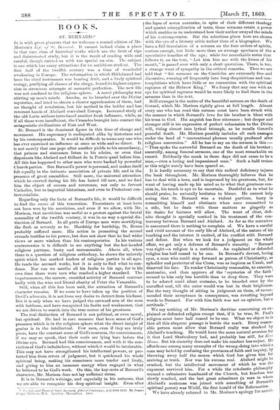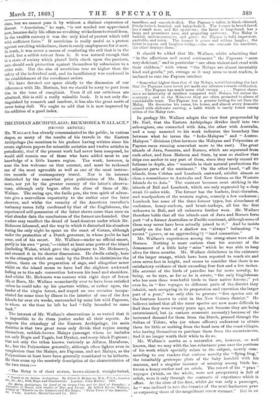BOOKS.
ST. BERNARD.*
IT is with great pleasure that we welcome a second edition of Mr. Morison's Life of St. Bernard. It cannot indeed claim a place in that rare class of historical works which are the fruit of ripe and disinterested study, but it is the result of reading wide and careful, though carried on with too special an aim. The subject is one which has many attractions for an ambitious student. The first half of the twelfth century was a time of wonderful awakening in Europe. The reformation in which Hildebrand had been the chief instrument was bearing fruit, and a lively spiritual energy, purifying all classes of the clergy, found its highest expression in strenuous attempts at monastic perfection. The new life was not confined to the religious sphere. A novel philosophy was stirring up men's minds. Anselm, as he brooded over the Divine mysteries, and tried to obtain a clearer apprehension of them, had no thought of revolution, but his method in the bolder and less reverent hands of Abelard convulsed Europe. Increased study of the old Latin authors introduced another fresh influence, while, as if all these were insufficient, the Crusades brought into contact the antagonistic civilizations of East and West.
St. Bernard is the dominant figure in this time of change and movement. his supremacy is undisputed alike by historians and by his contemporaries. It would be difficult to name any one who has ever exercised an influence at once so wide and so direct. It is not merely that one pope after another yields to his ascendancy, that princes and statesmen listen to his advice, or even that disputants like Abelard and Gilbert de la Porree quail before him. All this has happened to other men who were backed by powerful Church parties. But Bernard's power is personal, and makes itself felt equally in the intimate association of private life and in the presence of great assemblies. Still more, the universal attraction which he exerted during his life has lasted till now, and we find him the object of esteem and reverence, not only to fervent Catholics, but to impartial historians, and even to Protestant controversialists.
Regarding only the facts of Bernard's life, it would be difficult to find the cause of this veneration. Protestants at least have not been won by his asceticism, and even if we allow, with Mr. Morison, that asceticism was useful as a protest against the brutal sensuality of the twelfth century, it was in no way a special distinction of Bernard. In all parts of Europe men were mortifying the flesh as severely as he. Hardship for hardship, St. Bruno probably suffered more. His action in promoting the second crusade testifies to his power, but does not show that he had wider views or more wisdom than his contemporaries. In his various controversies it is difficult to see anything but the hot-headed religious partizan, hasty and unreasonable. Above all, when there is a question of religious orthodoxy, he shows the unlovely spirit which has marked leaders of religious parties in all ages. He reads the accused works, but it is only to find what to condemn. Nor can we ascribe all his faults to his age, for in his own time there were men who reached a higher standard. The impetuousness, the narrow, onesided activity of Bernard contrast badly with the wise and liberal charity of Peter the Venerable.
Still, when all this has been said, the attraction of Bernard's character remains. If we seem to have taken up the position of Devil's advocate, it is not from any desire to detract from his fame. But it is only when we have judged the outward acts of the man with boldness, and have recognized his faults and weaknesses, that certitude." we are driven to search into the true source of his greatness.
The real distinction of Bernard is not political, or even moral, but spiritual. He had in rare measure that keen sense of God's presence which is in the religious sphere what the direct insight of genius is in the intellectual. Few men, even if they are truly pious, have the constant sense of God's nearness, the consciousness, if we may so speak, that their souls are lying bare before the Divine eye. Bernard had this consciousness, and with it the conviction of God's infinite love, without which it would be intolerable. This may not have strengthened his intellectual powers, or protected him from errors of judgment, but it quickened his whole spiritual being, making his conscience more tender and lively, and giving to him an immense energy when engaged in what he believed to be God's work. On this, the key-note of Bernard's character, Mr. Morison does not lay sufficient stress.
It is in Bernard's writings, and especially in his sermons, that we are able to recognize his deep spiritual insight. Even after
the lapse of seven centuries, in spite of their different theology and quaint misapplication of texts, these sermons retain a power which enables us to understand bow their author swayed the minds of his contemporaries. But the selections given here are chosen with the eye of a literary critic rather than of a biographer. We have a full translation of a sermon on the four orders of spirits, curious enough, but little more than an average specimen of the • speculative homilies of the age; while the remarkable series that follows it, on the text, '• Let him kiss me with the kisses of his mouth," is passed over with only a short quotation. There, is too, a strange want of sympathy in the critical remarks. Thus we are told that "his sermons on the Canticles are extremely free and discursive, running off frequently into long disquisitions and contemplations which have little or no connection with the spiritual raptures of the Hebrew King." We fancy that any one with an eye for spiritual raptures would be more likely to find them in the sermons than in the text.
Still stranger is the notice of the beautiful sermon on the death of Gerard, which Mr. Morison rightly gives at full length. Almost every one who has read this sermon must have been struck with the manner in which Bernard's love for his brother is blent with his trust in God. His anguish has free utterance ; but deeper and stronger still is his expression of perfect submission to the Divine will, rising almost into lyrical triumph, as he recalls Gerard's peaceful death. Mr. Morison possibly includes all such passages under the head of "conventional phrases usually produced after religious conversion." All he has to say on the sermon is this :— "Thus spoke the sorrowful Bernard on the death of his brother ; assuredly, among funeral sermons, one of the most remarkable on record. Evidently the monk in those days did not cease to be a man,—even a loving and impassioned man." Such a bald truism as this might surely have been spared us.
It is hardly necessary to say that this radical deficiency injures the book throughout. Mr. Morison thoroughly believes that he has to deal with a hero, and is impressed by his greatness, but, for want of having made up his mind as to what that greatness consists in, his touch is apt to be uncertain. Doubtful as to what he should praise, he naturally hesitates to blame. He cannot help seeing that St. Bernard was a violent partizan, hasty in committing himself and obstinate when once committed to a side, but he deals with these matters as gingerly as his desire for fairness will allow. The want of clear, definite thought is specially marked in his treatment of the controversy between Bernard and Abelard. As far as the narrative is concerned there is nothing to complain of. We have a careful and vivid account of the early life of Abelard, of the nature of his teaching and the interest it excited, of his conflict with Bernard and defeat. But when we look for a judgment on the whole affair, we get only a defence of Bernard's sincerity. "Bernard was right—a religion is a certitude. An explained or defended religion has half ceased to be one. In Bernard's devout, loving eyes, a man who could step forward as patron of Christianity, as upholder and protector of the Cross, was as impious as Uzzah, and deserved his fate. To render Christianity reasonable, to examine, anatomize, and then approve of the mysteries of the faith seemed to him only less horrible than to deny them. They were to be adored amid silent ecstasies, to be brooded over by the unruffled soul, till the outer would was lost in their brightness. But the very thought of sitting in judgment on them, of recommended their acceptance in consequence, was revolting beyond words to Bernard. For with him faith was not an opinion, but a
We say nothing of Mr. Morison's doctrine concerning an explained or defended religion except that, if it be true, St. Paul's religion must have half ceased to be one. What we object to is that all this eloquent passage is beside the mark. Every reasonable person must allow that Bernard really was shocked by Abelard's teaching. He would have the same natural aversion for it that Lord Shaftesbury had, and probably has still, for Ecce Homo. But his sincerity does not make his conduct less unjust. He affords one among many examples of the wrong-doing into which a man may be led by confusing the provinces of faith and inquiry, by throwing away half the means which God has given him for arriving at truth. Nor was his success real. Abelard might be crushed, but the intellectual movement of which he was the exponent survived him. For a while the scholastic philosopbY seemed a submissive handmaid of the Church, but freedom was slowly reached, and the last great schoolman (a man in whom Abelard's acuteness was joined with something of Bernard s spiritual power) was Wiclif, the first herald of the Reformation..
We have already referred to Mr. Morison's apology for asceti
ciam, but we cannot pass it by without a distinct expression of dissent. "Asceticism," he says, "is not needed nor appreciated now, because daily life offers no revolting wickedness to recoil from. In the twelfth century it was the only kind of protest which told with sufficient force." If asceticism is really useful as a protest against revolting wickedness, there is surely employment for it now. In truth, it was never a means of combating the evil that is in the world, but a selfish retreat from it. It was natural enough that in a tate of society which placed little check upon the passions, men should seek protection against themselves by submission to a strict rule. But the aim of asceticism rose no higher than the safety of the individual soul, and its insufficiency was confessed in the establishment of the mendicant orders.
We have devoted our space chiefly to the discussion of our differences with Mr. Morison, but we should be sorry to part from him in the tone of complaint. Even if all our criticisms are admitted, this is still a really valuable book. It is not only distinguished by research and candour, it has also the great merit of never being dull. We ought to add that it is now improved by the addition of a good index.



































 Previous page
Previous page